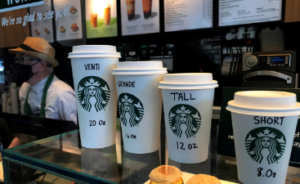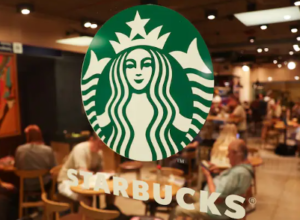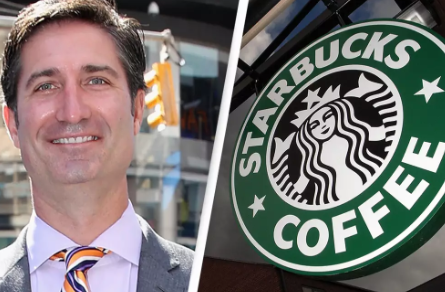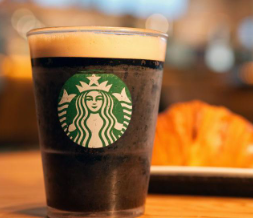Starbucks CEO Faces Backlash Over 1,000-Mile Commute on Corporate Jet: Environmental and Compensation Concerns Rise
SEO Keywords:
Starbucks CEO commute
Brian Niccol Starbucks
Starbucks environmental controversy
corporate jet commute
executive compensation Starbucks
sustainability hypocrisy Starbucks
Meta Description:
“Starbucks’ new CEO, Brian Niccol, faces criticism for his 1,000-mile commute from California to Seattle on a corporate jet, raising questions about the company’s commitment to sustainability and executive compensation. Learn more about the controversy.”
Introduction:
Starbucks, the world’s largest coffeehouse chain, is currently under scrutiny following the announcement that its newly appointed CEO, Brian Niccol, will be commuting nearly 1,000 miles from his home in Newport Beach, California, to the company’s headquarters in Seattle, Washington. The revelation that Niccol will utilize a corporate jet for this commute has triggered a wave of criticism, particularly in light of Starbucks’ vocal commitment to environmental sustainability.
Details of the Commute:
According to Niccol’s job offer, he is not required to relocate to Seattle and is permitted to use the company’s aircraft for “business-related travel” as well as commuting between his home and the corporate headquarters. Starbucks will also establish a small remote office in Newport Beach to accommodate Niccol’s work-from-home needs. This setup is part of Niccol’s transition into the role, scheduled to begin on September 9, 2024.
Public and Social Media Reaction:
The news has sparked significant backlash on social media, where users have highlighted what they perceive as a stark contrast between Starbucks’ sustainability efforts and the environmental impact of Niccol’s regular long-distance flights. Comments on platforms like X (formerly Twitter) reflect public concern about the inconsistency between corporate messaging and executive actions.
One user sarcastically remarked, “That’s nice… good convenience for top talent! But hope we don’t see too many new ‘sustainability’ and ‘environment’ related ads from @starbucks? Wink.”
Another pointed out the irony, stating, “The new Starbucks CEO is ‘supercommuting’ 1,000 miles to Seattle on a private jet to work, so don’t be too harsh on that waitress who gave you a plastic straw when you didn’t want one.”
Executive Compensation Controversy:
Beyond environmental concerns, the discussion has also touched on the issue of executive compensation. Niccol’s compensation package includes a base salary of $1.6 million, with potential bonuses up to $7.2 million and the possibility of earning up to $23 million in Starbucks shares annually. This has prompted criticism from figures like former U.S. Secretary of Labor Robert Reich, who questioned the fairness of such pay scales amidst rising consumer prices.

Background on Brian Niccol:
Brian Niccol is not new to leading major brands. Prior to joining Starbucks, he served as CEO of Chipotle Mexican Grill, where he successfully steered the company through a recovery phase following a series of food safety crises. Under his leadership, Chipotle’s sales doubled, and the company’s stock price surged. His experience and track record were likely key factors in his selection as the next CEO of Starbucks.
Impact on Starbucks’ Public Image:
This controversy comes at a critical time for Starbucks, as the company works to revitalize its brand and boost sales. The apparent disconnect between its sustainability goals and the lifestyle choices of its top executive could have lasting implications for its public image.
As Brian Niccol steps into his new role at Starbucks, the scrutiny surrounding his commute and compensation will likely continue. For a company that has built its brand on social responsibility, how Starbucks addresses these concerns will be closely watched by both consumers and stakeholders alike.
Carbon Emissions:
Include data on the carbon footprint of private jet travel compared to commercial flights. For example, private jets can emit up to 10 times more carbon per passenger compared to commercial flights.
Provide estimates on the total annual carbon emissions from Niccol’s commute if he flies round trip multiple times a week.
Comparison with Starbucks’ Sustainability Goals:
Reference Starbucks’ public sustainability goals, such as its commitment to reducing carbon emissions by 50% by 2030.
Discuss how Niccol’s private jet usage might conflict with these goals, citing any relevant data or expert opinions on corporate sustainability practices.
Comparison with Industry Peers:
Compare Niccol’s compensation package with those of other CEOs in the food and beverage industry, especially within companies known for their sustainability efforts (e.g., McDonald’s, PepsiCo).
Highlight trends in CEO pay versus average worker wages in the U.S., particularly within Starbucks, to provide context for the public backlash.
Historical Context:
Discuss how Niccol’s compensation compares to that of his predecessor, Laxman Narasimhan, or other past Starbucks CEOs. Provide data on whether executive compensation at Starbucks has increased in recent years.
Consumer Sentiment Analysis:
Data or insights from recent surveys or studies on consumer trust in corporations regarding sustainability.
Highlight any studies showing the impact of executive behavior on brand loyalty, particularly in companies that emphasize social responsibility.
Past Incidents of Corporate Hypocrisy:
Reference other high-profile cases where corporate leaders’ actions contradicted their companies’ public messaging, and how those incidents impacted brand perception.
-
- Sales Trends:
- Provide data on Starbucks’ sales trends over the past few quarters, noting any declines or recoveries and tying this to Niccol’s upcoming leadership.
- Include financial performance metrics, such as same-store sales growth, to illustrate the challenges Starbucks is currently facing.
- Sales Trends:
- Comparison with Competitors:
- Compare Starbucks’ recent performance with that of competitors like Dunkin’ or local coffee chains, especially in the context of rising consumer expectations for sustainability.
- Employee Sentiment:
- If available, include data on employee reactions to Starbucks’ hybrid work policy, such as survey results or anonymous feedback from platforms like Glassdoor.
- Discuss how Niccol’s commuting arrangement might influence perceptions of fairness among Starbucks employees who are required to be in the office several days a week.
- Industry-Wide Trends:
- Provide context by comparing Starbucks’ hybrid work policy with those of other major corporations, particularly in the tech and retail sectors.
- Board of Directors’ Role:
- Discuss the role of Starbucks’ board of directors in approving executive compensation and perks. Provide data on how other companies handle similar situations.
- Shareholder Reactions:
- If available, include data or statements from major shareholders or institutional investors regarding their stance on Niccol’s compensation and commuting arrangements.
- Potential Impact on Stock Price:Analyze whether controversies like this typically have short-term or long-term impacts on a company’s stock price, providing examples from similar situations.
- Response Strategies:
- Offer insights or data on effective public relations strategies for managing corporate controversies, potentially referencing how Starbucks has handled past PR challenges.
- International Reactions:
- If relevant, include perspectives from international markets where Starbucks operates, particularly in regions with strong environmental movements.







